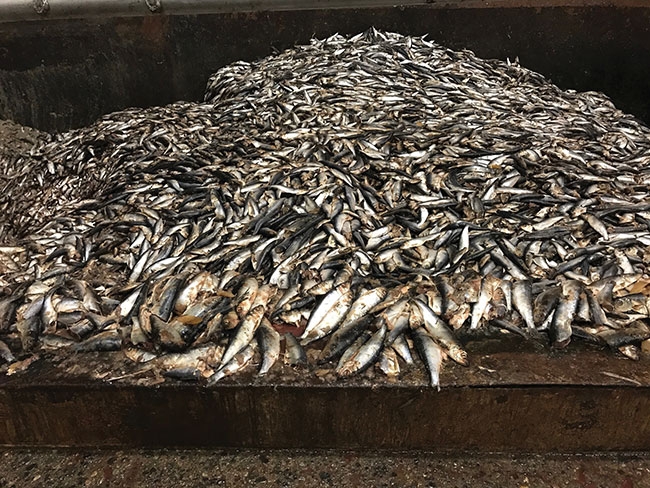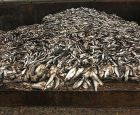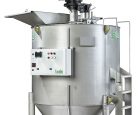
Morts processing evolves, makes inroads in North America
February 5, 2019
By Aquaculture North America Staff
In fish farming, ensiling is a way of processing fish mortalities and avoiding disease issues. The process has long been popular in other parts of the world, such as Norway, where there are strict bio-security regulations on how mortalities are dealt with.
 A pile of herring destined for rendering into value-added product. Evolving regulations and potential secondary-market uses for byproducts has opened up opportunities for companies specializing in morts processing. In fish farming
A pile of herring destined for rendering into value-added product. Evolving regulations and potential secondary-market uses for byproducts has opened up opportunities for companies specializing in morts processing. In fish farmingHowever, with evolving regulations and potential secondary market uses for by-products, ensiling has started to take hold in certain markets in North America. Landia Inc, a Danish firm that provides pumping, mixing and wastewater solutions to the farming, biogas and fish industries, has started to make inroads into British Columbia in recent years and hopes that the process will soon catch on elsewhere.
“The process is normally where you churn up the morts in our system,” says Jesper Borch Svendsen, Landia’s area sales manager for the fish industry. “It starts a hydrolyze process where you break down all the meat and bones so you get a liquid out of it. After you have produced the silage, then you have a product you can refine later.”
In many cases, Svendsen says, fish silage has been refined and used in pet foods, fertilizers and as a component in biogas production. Another benefit is that the silage can be stored in liquid tanks. Traditionally, stored mortalities waiting to be taken to a landfill will begin to smell very shortly. Silage can be stored in a tank for longer periods of time, significantly benefitting more remote operations. Landia’s key offering for the fish industry is the BioChop, a processing unit that can be used in farming facilities or on board fishing vessels for the capture industry.
“On the west coast of Canada, we’re working with a local company, CPI Equipment,” says Landia director Soren Rasmussen. “They market our solutions on Vancouver Island. CPI Equipment came to us and said that they had customers in BC that are in need of this technology. They seem to have a lot of interest in it out there.”
Rasmussen says that while mortality related regulations haven’t dictated the need for these products yet, the producers in the area believe it is only a matter of time. And that may be true in other parts of North America as well.
“That legislation will be coming and they will want to be at the forefront,” says Rasmussen.
Advertisement
- InnovaSea acquires Water Management Technologies
- US patent given to company to grow gourmet-grade shrimp in enclosed, salt water system







